#vascular surgeon vadodara
Text
Exploring the Genetic Links to Varicose Veins: Insights from Dr. Sumit Kapadia
Varicose veins are not only a common health issue affecting millions worldwide but also a condition deeply intertwined with genetic factors. Dr Sumit Kapadia, a leading Varicose Vein Specialist in Vadodara, sheds light on how genetics play a pivotal role in the development of varicose veins, making some individuals more susceptible than others.

Understanding the Genetic Influence
The research underscores the strong hereditary nature of varicose veins. Statistics reveal that having one parent with varicose veins increases your risk by 40%, which skyrockets to 90% if both parents are affected. These figures highlight the significant genetic predisposition involved in the manifestation of varicose veins.
Genetic Mechanisms at Play
Varicose veins develop due to the weakening of vein walls and valves, often exacerbated by genetic factors. Specific genetic mutations can alter the structural integrity of veins, reducing their ability to efficiently circulate blood. These genetic predispositions contribute to the weakening of the extracellular matrix and the dysfunction of smooth muscle cells within the vein walls, pivotal factors in the formation of varicose veins.
Mitigating Genetic Risks
Despite the strong genetic factors, lifestyle and environmental factors play crucial roles in managing the risk and progression of varicose veins. Regular exercise, maintaining a healthy weight, avoiding prolonged standing or sitting, and wearing compression stockings are proactive steps that can mitigate the onset and severity of varicose veins, even in genetically predisposed individuals.
The Path Forward with Genetic Research
The ongoing research into the genetic basis of varicose veins promises more personalized and effective treatment options in the future. Identifying specific genetic markers associated with varicose veins can lead to targeted therapies that address the underlying genetic causes, paving the way for precision medicine in vascular health.
Conclusion
The link between genetics and varicose veins is undeniable, emphasizing the need for awareness and proactive management. For those at higher genetic risk, regular consultations with a vascular specialist like Dr. Sumit Kapadia are essential. Dr. Kapadia's expertise in varicose veins provides patients with tailored treatments that consider both genetic and lifestyle factors, offering a comprehensive approach to managing this complex condition.
For more detailed insights into the role of genetics in varicose veins and expert guidance on managing the condition, visit Dr. Sumit Kapadia's detailed blog post here.
Watch Videos
The YouTube home of Dr. Sumit Kapadia, a leading Vascular & Endovascular Surgeon based in Vadodara, Gujarat, India. With over 20 years of experience, Dr. Kapadia is a trusted authority in treating a variety of vascular problems like varicose veins, peripheral arterial diseases, diabetic foot, vascular malformations, and dialysis fistula. This channel is your go-to resource for expert insights, tips, and advice on vascular health. Join us as we delve into the world of vascular surgery and explore common conditions, treatments, and the latest advancements in the field.
Subscribe now and stay informed!
Dr Sumit is currently the Director at Aadicura Superspeciality Hospital, Vadodara. Aadicura Hospital has one of the largest teams of vascular surgeons in Western India.
Think Vascular, Think Aadicura!
For further info: visit https://www.drsumitkapadia.com/
For appointments, call on 8980500032
For online appointments, call/Whatsapp on 7203034017
#deep vein thrombosis#vascular surgeon#best treatment for varicose veins#laser varicose veins treatment#vein specialist doctor near me#av fistula surgery#spider vein treatment#varicose veins best doctor#Venaseal#varicose veins laser surgery#vascular surgeon vadodara#endovascular surgeon#endovascular surgery
0 notes
Text
How serious is Deep Vein Thrombosis?
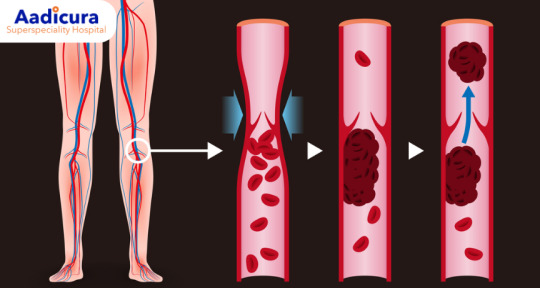
Deep vein thrombosis (DVT) is a blood clot that forms in a deep vein, usually in the legs. It occurs when a blood clot (thrombus) forms in one or more of the deep veins in your body, usually in your legs. DVT can cause pain, swelling, and redness in the affected limb, but it can also occur without any symptoms. If the clot breaks loose, it can travel to your lungs and block blood flow (pulmonary embolism). This can ocassionally be life-threatening. If you notice any of the symptoms mentioned, we advise you to consult a Vascular Surgeon in Vadodara to avoid severe complications.
The symptoms of deep vein thrombosis (DVT) can vary and may not be present in all cases. Some common symptoms of DVT include:
Swelling: This is the most common symptom of DVT and occurs when a blood clot obstructs the flow of blood through the vein.
Pain or tenderness: This can be felt in the affected limb and may only be noticed when standing or walking.
Redness or discoloration: The skin over the affected vein may appear reddish or bluish in color.
Warm skin: The skin over the affected vein may feel warm to the touch.
Cramping or aching in the affected limb: This can occur due to the blood flow obstruction.
Tiredness or fatigue: DVT can cause a general feeling of being unwell or weak.
Shortness of breath: In some cases, a DVT can travel to the lungs and cause a pulmonary embolism, which can cause shortness of breath, chest pain, and a rapid heartbeat.
It’s important to note that some people with DVT may not have any symptoms at all. If you suspect you have DVT, it’s important to seek medical attention from a Best Vascular Surgeon in Vadodara as soon as possible, as untreated DVT can lead to serious complications such as pulmonary embolism and chronic venous insufficiency.
Risk factors for DVT include:
● Recent surgery or injury
● Prolonged bed rest, such as after a surgery or illness
● Certain medical conditions, such as cancer or heart failure
● Being pregnant or taking birth control pills or hormone replacement therapy
● Being older or overweight
● Family History
● Smoking
Treatment of deep vein thrombosis:
At Aadicura Superspeciality Hospital Vadodara we believe that it’s important to work closely with the DVT specialist to determine the best treatment plan for you. Treatment duration varies depending on the DVT location, the size of the clot, and the underlying medical condition.
Treatment for deep vein thrombosis (DVT) typically includes the use of blood thinners (anticoagulants) to prevent the clot from getting bigger and to reduce the risk of pulmonary embolism (a potentially life-threatening condition that occurs when a blood clot travels to the lungs). The main goal of treatment is to prevent the clot from growing, prevent new clots from forming, and prevent the clot from breaking off and traveling to the lungs.
The most common anticoagulant medications used to treat DVT include:
Heparin or Low Molecular Weight Heparin ( LMWH)
Warfarin (Coumadin)
Rivaroxaban (Xarelto), Apixaban (Eliquis), Dabigatran (Pradaxa), Edoxaban (Savaysa)
Direct oral anticoagulants (DOACs)
In addition to anticoagulant medications, other treatments for DVT may include:
Compression stockings: These are specially designed stockings that apply pressure to the legs to help improve circulation and reduce swelling.
Thrombolysis: This is a procedure in which a clot-dissolving medication is delivered directly to the clot through a catheter. We recommend using a catheter directed thrombectomy ( angiojet thrombectomy) or thrombolysis in extensive thrombosis especially in young patients for better preservation of valve function within the veins.
Surgical thrombectomy: This is a procedure in which a surgeon removes the clot from the vein.
Inferior vena cava (IVC) filter: This is a small device that is placed into the main vein in the abdomen to prevent clots from traveling to the lungs.
Physical therapy and exercise may also be recommended to help improve circulation and prevent post-thrombotic syndrome (a condition that can occur after DVT and is characterized by chronic swelling and pain in the affected limb).
FAQ’S
What is the best treatment for DVT?
The best treatment for deep vein thrombosis (DVT) typically includes the use of blood thinners (anticoagulants) to prevent the clot from getting bigger and to reduce the risk of pulmonary embolism. The main goal of treatment is to prevent the clot from growing, prevent new clots from forming, and prevent the clot from breaking off and traveling to the lungs. Catheter based modern treatments are often utilized for earlier resolution of extensive thrombosis as well as preservation of valve function.
Is DVT a serious problem?
Deep vein thrombosis (DVT) can be a serious problem if left untreated. DVT is caused by a blood clot that forms in a deep vein, usually in the legs. While some people with DVT may not have any symptoms, it can cause pain, swelling, and redness in the affected limb. Apart from local problems, the most serious complication of DVT is the risk of massive Pulmonary Embolism.
What are the consequences or complications of DVT?
Deep vein thrombosis (DVT) can lead to several serious complications if left untreated, including:
Pulmonary embolism (PE)
Post-thrombotic syndrome (PTS)
Chronic venous insufficiency (CVI)
Recurrent DVT
Long-term anticoagulation therapy
Amputation ( rarely due to Venous Gangrene).
It’s important to note that DVT can be recurrent and long-term follow-up and management with a healthcare professional is essential.
Do all persons with DVT need hospitalization?
Not all people with deep vein thrombosis (DVT) need to be hospitalized. The decision to hospitalize a person with DVT depends on the individual’s condition and the severity of the DVT.
Who is the best doctor to treat DVT?
Deep vein thrombosis (DVT) is typically treated by different specialities. At Aadicura superspeciality hospital, our expert team of vascular specialists have a very high reputation and experience in handling such complex cases.
It’s important to seek medical attention or Vascular Specialist in Vadodara if you have any symptoms of DVT. If left untreated, DVT can lead to serious complications such as pulmonary embolism, post-thrombotic syndrome, and chronic venous insufficiency.
0 notes
Text
Vascular Surgeon In Vadodara

"Dr Kushan Nanavati (MBBS, MS, DNB Vascular Surgery) is a hardcore Vascular surgeon trained in the prestigious Sir Gangaram Hospital, New Delhi. He is practising as a Consultant Vascular - Endovascular Surgeon at Aadicura Superspeciality Hospital, Vadodara, Gujarat. He is dedicated exclusively to the care of veins & artery (Blood Circulatory System) related diseases. He strongly believes in the “Putting Patients First approach". Alongside the focused scientific approach, he also tries to maintain a holistic attitude while treating patients. His special area of interest is in treating Varicose veins & Diabetic foot disease."
0 notes
Text
Plastic Surgeon In Vadodara | Facial Reconstruction Surgery | BAGH
BAGH's Department of Plastic and Reconstructive Surgery provides world-class facial reconstruction surgery. Consult our best plastic surgeon in Vadodara today.
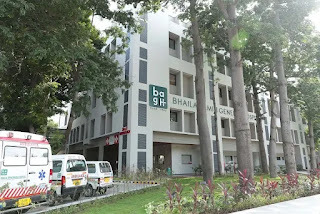
Specialty At Glance
Expertise with World-class Modalities to Enhance the Beautiful You
Overview:
Plastic surgery is a surgical specialty involving the restoration, reconstruction, or alteration of the human body. It can be divided into two categories. The first is reconstructive surgery which includes craniofacial surgery, hand surgery, microsurgery, and the treatment of burns. The other is cosmetic or aesthetic surgery. While reconstructive surgery aims to reconstruct a part of the body or improve its functioning, cosmetic surgery aims at improving the appearances of it.
The Department of Plastic & Cosmetic Surgery is supported by expert aesthetic surgeons with many years of experience in the specialized field who have trained at leading institutes for micro vascular and reconstructive surgery for saving limbs, enabling life and aiding faster recovery towards normal routine.
At BAGH, the team of aesthetic plastic surgeons is supported by high-end resources such as advanced microscopes, laser machines, liposuction machines and well-equipped Day-care facilities for treating the clinical needs for such patients and giving lease to new life.
0 notes
Link
Dr. Kushan Nanavati (MBBS, MS, DNB) is eminent, MCI recognized Consultant Vascular - Endovascular Surgeon practicing in Vadodara, Gujarat since 2019. He is the Best Vascular Surgeon in Vadodara city.
#Vascular Surgery Treatment Doctors in Vadodara#Varicose Treatment#Vascular Surgeon in Vadodara#Best Vascular Surgeon in Vadodara
1 note
·
View note
Text
Vascular Surgeon in Vadodara
Are you looking for Vascular Surgeon in Vadodara, Gujarat? Dr. Vijay Thakore is a Senior & Qualified Vascular and Endovascular Surgeon in clinical practice for the last 25 years. He has vast experience in treating various vascular & endovascular disorders like Varicose Veins, Deep Vein Thrombosis (DVT), Aortic Aneurysm, Carotid Endarterectomy, Dialysis Access Operations for kidney failure patients, and many more. Book an appointment today! For More information: Visit Our Website: www.vijaythakore.com Call On: 0265-233 1343 OR 7779041234 Email us: [email protected]
#vascular#vascularsurgeon#vascularsurgery#endovascular#vasculardisease#Varicose Veins#VaricoseVeinTreatment
1 note
·
View note
Text
Best General Surgery Hospital in Vadodara
General surgery is a surgical specialty that focuses on surgery of abdominal contents including esophagus, stomach, small bowel, colon, liver, pancreas, gallbladder and bile ducts, and often the thyroid gland (depending on local reference patterns). They also deal with diseases involving the skin, breast, soft tissue, trauma, peripheralvascular surgery and hernias
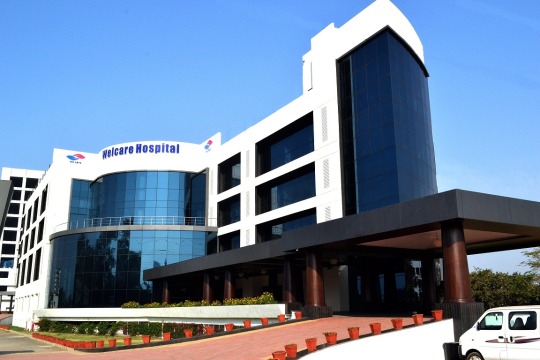
Sub-specialities:
1. Laparoscopic surgery
This is a relatively new speciality dealing with minimal access techniques using cameras and small instruments inserted through 0.3 to 1 cm incisions. Robotic surgery is now evolving from this concept. Gallbladders, appendices, and colons can all be removed with this technique. Hernias are now repaired mostly laparoscopically. Most bariatric surgery is performed laparoscopically.
2. Colorectal surgery
General surgeons treat a wide variety of major and minor colon and rectal diseases including inflammatory bowel diseases (such as ulcerative colitis or Crohn’s disease), diverticulitis, colon and rectal cancer, gastrointestinal bleeding and hemorrhoids.
3. Breast surgery
General surgeons perform a majority of all non-cosmetic breast surgery from lumpectomy to mastectomy, especially pertaining to the evaluation and diagnosis, of breast cancer.
4. Endocrine surgery
General surgeons are trained to remove all or part of the thyroid and parathyroid glands in the neck and the adrenal glands just above each kidney in the abdomen.
5. Vascular surgery
General surgeons can perform vascular surgery if they receive special training and certification in vascular surgery. However, general surgeons are capable of treating minor vascular disorders.
6. Surgical oncology
Surgical oncologist refers to a general surgical oncologist (a specialty of a general surgeon), but thoracic surgical oncologists, gynecologist and so forth can all be considered surgeons who specialize in treating cancer patients. The importance of training surgeons who sub- specialize in cancer surgery lies in evidence, supported by a number of clinical trials, that outcomes in surgical cancer care are positively associated to surgeon volume—i.e., the more cancer cases a surgeon treats, the more proficient he or she becomes, and his or her patients experience improved survival rates as a result. A surgeon who performs a given operation more often, will achieve superior results when compared with a surgeon who rarely performs the same procedure.
7. Transplant surgery
Responsible for all aspects of pre-operative, operative, and post-operative care of abdominal organ transplant patients. Transplanted organs include liver, kidney, pancreas, and more rarely small bowel.
PLASTIC SURGERY:
Aesthetic surgery
Aesthetic surgery is an essential component of plastic surgery and includes facial and body aesthetic surgery. Plastic surgeons use cosmetic surgical principles in all reconstructive surgical procedures as well as isolated operations to improve overall appearance.
Craniofacial surgery
Craniofacial surgery is divided into pediatric and adult craniofacial surgery. Pediatric craniofacial surgery mostly revolves around the treatment of congenital anomalies of the craniofacial skeleton and soft tissues, such as cleft lip and palate, craniosynostosis, and pediatric fractures. Adult craniofacial surgery deals mostly with fractures and secondary surgeries (such as orbital reconstruction) along with orthognathic surgery. Craniofacial surgery is an important part of all plastic surgery training programs, further training and subspecialisation is obtained via a craniofacial fellowship.
Hand surgery
Hand surgery is concerned with acute injuries and chronic diseases of the hand and wrist, correction of congenital malformations of the upper extremities, and peripheral nerve problems (such as brachial plexus injuries or carpal tunnel syndrome). Hand surgery is an important part of training in plastic surgery, as well as microsurgery, which is necessary to replant an amputated extremity. The Hand surgery field is also practiced by orthopedic surgeons and general surgeons. Scar tissue formation after surgery can be problematic on the delicate hand, causing loss of dexterity and digit function if severe enough. There have been cases of surgery to women’s hands in order to correct perceived flaws to create the perfect engagement ring photo.
Burn surgery
Burn surgery generally takes place in two phases. Acute burn surgery is the treatment immediately after a burn. Reconstructive burn surgery takes place after the burn wounds have healed.
Pediatric plastic surgery
Children often face medical issues very different from the experiences of an adult patient. Many birth defects or syndromes present at birth are best treated in childhood, and pediatric plastic surgeons specialize in treating these conditions in children. Conditions commonly treated by pediatric plastic surgeons include craniofacial anomalies, cleft lip and palate and congenital hand deformities.
Microsurgery
Microsurgery is generally concerned with the reconstruction of missing tissues by transferring a piece of tissue to the reconstruction site and reconnecting blood vessels. Popular subspecialty areas are breast reconstruction, head and neck reconstruction, hand surgery/replantation, and brachial plexus surgery To know more, visit www.welcarehospital.co.in
1 note
·
View note
Photo
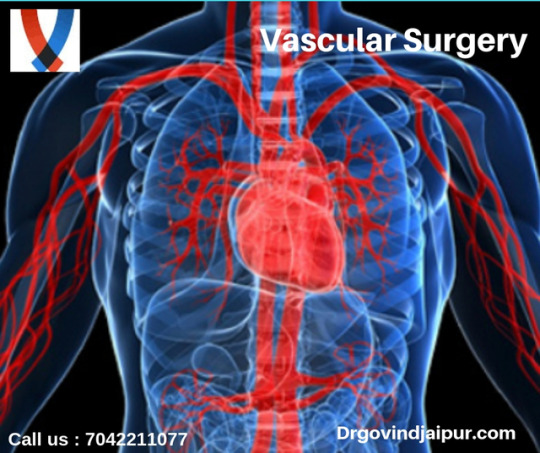
Best Vascular Surgeons in Jaipur
Dr Govind Prasad Dubey is one of the best Vascular Surgeons in jaipur. MBBS (GMC NAGPUR}, MS (Gen. Surgery, GMC VADODARA) DNB (VASCULAR SURGERY, MEDANTA THE MEDICITY HOSPITAL GURGAON). Call us 7042211077. Website: http://www.drgovindjaipur.com/
0 notes
Text
Choosing the Right Compression Socks for Optimal Comfort and Effectiveness
Compression socks are essential for individuals experiencing discomfort, swelling, or poor circulation in their legs. However, selecting the right pair can be daunting given the variety of options available. Dr Sumit Kapadia, a renowned vascular specialist in Vadodara, provides expert insights to help you make an informed choice.

Understanding Compression Levels:
Compression socks come in various levels, each suited to different needs:
Mild Compression (8-15 mmHg): Ideal for minor swelling and everyday wear to enhance circulation.
Moderate Compression (15-20 mmHg): Recommended for managing mild to moderate swelling, varicose veins, and during pregnancy.
High Compression (20-30 mmHg and above): Best for severe venous conditions like deep vein thrombosis (DVT) and chronic venous insufficiency.
Material and Fabric Quality:
The effectiveness of compression socks largely depends on their material:
Nylon and Spandex: Provide durability and a snug fit, ensuring consistent compression.
Cotton: Offers comfort and breathability, suitable for sensitive skin.
Polyester: Known for moisture-wicking properties, keeping feet dry and comfortable.
Choosing the Right Style:
Compression socks are available in various styles to suit individual preferences and medical needs:
Knee-high socks: Commonly used for general comfort and minor leg swelling.
Thigh-high socks: Provide comprehensive leg coverage, ideal for more severe conditions.
Open-toe socks: Offer comfort for those who prefer less restriction at the toes.
Why Compression Socks Are Essential:
Compression socks are not just for those with medical conditions; they benefit anyone standing or sitting for long periods, such as office workers, travellers, or pregnant women. They help prevent fatigue, reduce swelling, and can significantly enhance quality of life by improving blood circulation.
Consulting a Varicose Veins Specialist:
For optimal benefits, it is advisable to consult with a varicose vein specialist like Dr. Sumit Kapadia in Vadodara. He can provide guidance based on a thorough assessment of your specific vascular health needs.
Conclusion:
Choosing the right compression socks involves understanding your specific needs, the quality of materials, and the different styles available. With expert advice from specialists like Dr Sumit Kapadia, you can find the perfect match to support your leg health and improve your daily comfort. Visit Dr. Sumit Kapadia's website or contact his clinic for more personalized advice and information on managing vascular health efficiently.
#deep vein thrombosis#vascular surgeon#best treatment for varicose veins#laser varicose veins treatment#vein specialist doctor near me#av fistula surgery#spider vein treatment#varicose veins best doctor#Venaseal#varicose veins laser surgery#vascular surgeon vadodara#endovascular surgeon#endovascular surgery
0 notes
Text
Identifying and Understanding the Risk Factors of Varicose Veins
Varicose veins, characterized by swollen, twisted veins usually visible on the legs, affect a significant portion of the population. While often considered a cosmetic issue, they can lead to discomfort and health complications. Recognizing the risk factors associated with varicose veins is essential for early detection and effective management.
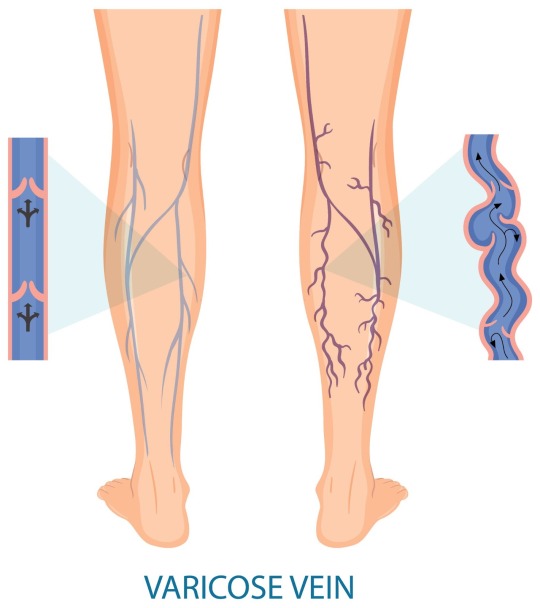
Key Risk Factors of Varicose Veins
Varicose veins develop due to various factors, some of which are controllable, while others are inherent. Key risk factors of Varicose Veins include:
Genetic Predisposition: A family history of varicose veins significantly increases the likelihood of developing them. This genetic link suggests an inherited tendency for weaker vein walls or valves.
Gender and Hormonal Factors: Women are more prone to varicose veins, especially during hormonal changes such as pregnancy, menstruation, and menopause. Hormones like progesterone can relax vein walls, exacerbating the risk of varicose veins. The use of hormonal contraceptives and hormone replacement therapy might also increase this risk.
Age: The risk of varicose veins increases with age. Aging causes wear and tear on the vein valves, impairing their function. The natural loss of skin elasticity and muscle tone with age further contributes to the development of varicose veins.
Lifestyle and Occupational Factors: Sedentary lifestyles and occupations requiring prolonged standing or sitting can hinder proper blood flow, increasing the risk of varicose veins. Regular movement and exercise can mitigate this risk.
Obesity: Excessive body weight puts additional strain on the veins, especially in the legs. This increased pressure can lead to varicose veins, making weight management a crucial preventive measure.
Pregnancy: Pregnancy is a significant risk factor due to increased blood volume and hormonal changes. The additional pressure on leg veins during this period makes women more susceptible to varicose veins during pregnancy.
Importance of Early Identification
Early identification of these risk factors is crucial for timely intervention. Regular check-ups and monitoring are important, especially for those with a family history of varicose veins or during pregnancy. Lifestyle modifications, such as regular exercise, maintaining a healthy weight, and avoiding prolonged standing, can significantly reduce the risk of developing varicose veins.
Dr. Sumit Kapadia, a renowned varicose veins specialist in Vadodara, emphasizes the importance of understanding these risk factors. As a leading varicose veins specialist in Vadodara practicing at Aadicura Superspeciality Hospital, Dr Kapadia recommends individuals at risk to seek professional advice for early detection and effective management of varicose veins.
For those showing signs or at risk of varicose veins, consulting a specialist like Dr. Kapadia can provide comprehensive care and preventive strategies. Reach out to Dr Sumit Kapadia’s 24 x 7 Vascular Helpline at +91 9904114443 for expert guidance and treatment options.
#vascular surgeon#dr. sumit kapadia#vascular surgery#endovascular specialist#varicose vein treatment#varicose veins#vascular specialist#peripheral arterial disease#varicose veins specialist in Vadodara#varicose veins during pregnancy
0 notes
Text
Edema : Types, Causes, Symptoms, and Treatment by Dr. Sumit Kapadia

Discover the different types of edema and learn about symptoms, causes, and treatment options from Dr. Sumit Kapadia, a leading vascular surgeon in Vadodara.
#Swelling In Legs#Vascular Surgeon In Vadodara#Best Vascular Surgeon In Vadodara#Varicose Veins Doctor In Vadodara#Vein Specialist Doctor In Vadodara#Varicose Vein Specialist In Vadodara#Vascular Surgeon Near Me#Varicose Veins Treatment In Vadodara#Best Vascular Surgeon In Gujarat#Varicose Veins Specialist Doctor Near Me#Best Surgeon In Vadodara
0 notes
Text
Understanding Edema: Types, Symptoms, and Effective Treatments
What is Edema?
Edema, commonly recognized as swelling, is the accumulation of fluid in the body's tissues. It often affects extremities like hands, feet, and legs but can occur anywhere in the body. Edema results from an imbalance in fluid regulation involving blood vessels, the lymphatic system, and the kidneys.

Different Types of Edema
Edema manifests in several forms, each with distinct causes:
Lymphedema: Caused by lymphatic system blockages.
Deep Vein Thrombosis (DVT) and Blood Clots: Resulting in swelling, often in one leg.
Pulmonary Edema: Fluid accumulation in the lungs, frequently related to heart issues.
Cerebral Edema: Brain swelling due to injury, infection, or other medical conditions.
Macular Edema: Affecting the eye's retina, often linked to diabetes.
Peripheral Edema: Swelling in the lower extremities, possibly due to heart, kidney, or liver diseases.
Pitting Edema: Identified by a dimple remaining after pressing the swollen area.
Periorbital Edema: Swelling around the eyes.
Symptoms of Edema
Common symptoms include swelling, stretched or shiny skin, pain, and reduced mobility. Each edema type has specific symptoms, like shortness of breath in pulmonary edema or vision changes in macular edema.
Causes and Underlying Conditions
Edema can arise from prolonged sitting/standing, dietary factors, medical conditions like heart failure or kidney disease, certain medications, and hormonal changes.
Treatment Options
Treatment varies based on the underlying cause, ranging from lifestyle changes and medication to more advanced medical interventions for severe cases.
Effective Ways to Reduce Leg Swelling: Causes and Treatment Options
When to Seek Medical Help
Immediate medical attention is necessary for sudden, severe swelling or if accompanied by symptoms like chest pain or shortness of breath.
Self-Care Tips
Dr Sumit Kapadia advises reducing salt intake, exercising regularly, and elevating legs to manage mild edema cases effectively.
Recovery Expectations
Recovery time varies based on the treatment and underlying cause. Early diagnosis and appropriate management are key to effective treatment outcomes.
Contact Dr Sumit Kapadia, a renowned vascular surgeon in Vadodara for personalized care and expert treatment for oedema. Best Vascular and Endovascular Surgeon Dr Sumit Kapadia at Aadicura Superspeciality Hospital, patients receive not just treatment but a roadmap to better guidance for the treatment of edema. For consultations, reach out to Dr Sumit Kapadia’s appointment number or send a “Hi” message to +91 9904114443 on WhatsApp (Dr Sumit Kapadia’s 24 x 7 Vascular Helpline).
#vascular surgery#vascular surgeon in vadodara#best vascular surgeon in vadodara#varicose veins doctor in vadodara#vein specialist doctor in vadodara#varicose vein specialist in vadodara#vascular surgeon near me#varicose veins treatment in vadodara#best vascular surgeon in gujarat#varicose veins specialist doctor near me#best surgeon in vadodara
1 note
·
View note
Text
Vascular Surgeon in Vadodara | Varicose Veins Specialist in Gujarat
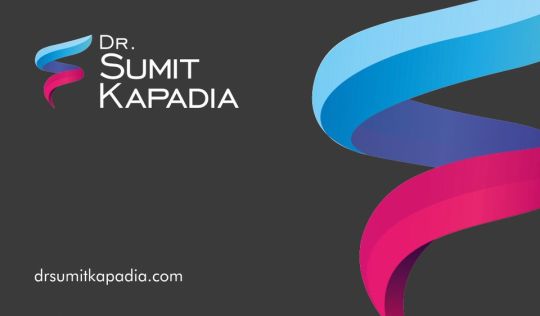
Meet the renowned Vascular Surgeon in Vadodara, Gujarat, Dr. Sumit Kapadia, a distinguished specialist in endovascular procedures for varicose veins, artery conditions, and lymphatic disorders. Discover top-notch vascular care with a trusted expert.
#Vascular Surgeon#Dr. Sumit Kapadia#Vadodara#Gujarat#Endovascular Specialist#Varicose Veins#Artery Conditions#'Lymphatic Disorders#Vascular Care#Medical Specialist#Vascular Surgery
0 notes
Text
Best Workouts for blood Circulation - Dr.Sumit Kapadia
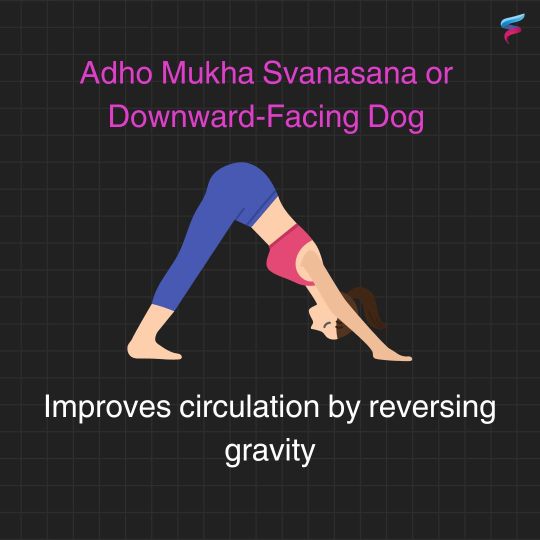
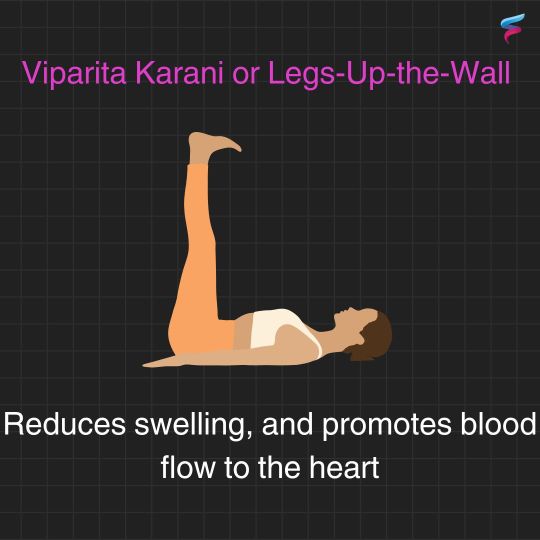
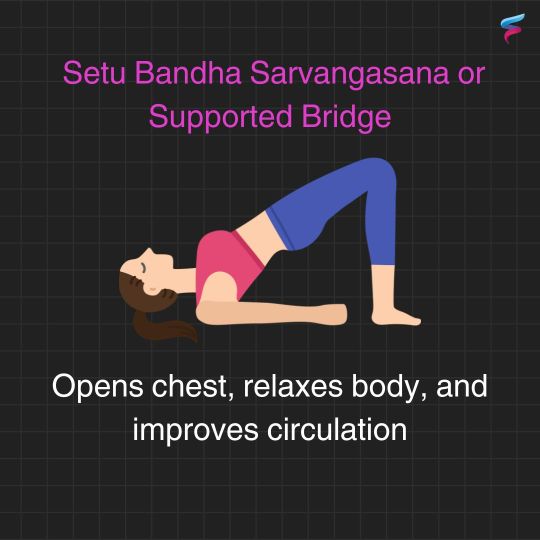
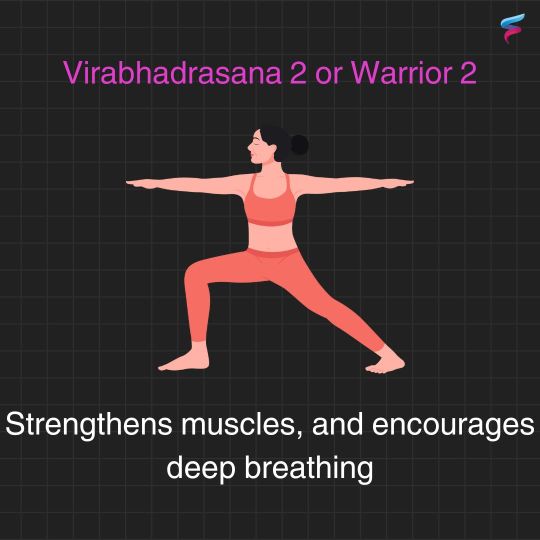
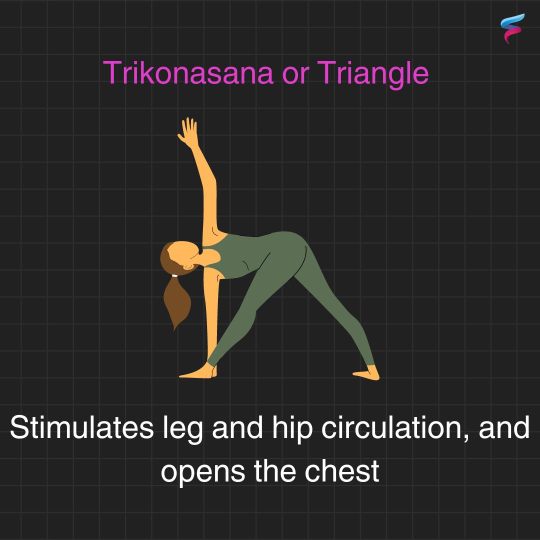
Learn about the impact of exercise on varicose veins and best workouts for blood circulation by Dr. Sumit Kapadia, the leading vascular surgeon in Vadodara.
If you experience persistent symptoms or require medical assistance, don’t hesitate to connect with Dr. Sumit Kapadia, the leading vascular surgeon in Vadodara, for expert guidance and treatment options.
#varicose veins best doctor#laser varicose veins treatment#endovascular surgery#best treatment for varicose veins#laser treatment for varicose veins#av fistula surgery#Varicose Vein Surgery#Varicose Vein#Swelling In Legs#Vascular Specialist#Varicose Veins Surgeon#Compression Stockings#Varicose Vein Doctors Near Me#Varicose Vein Doctor#Leg Injury
0 notes
Text
Varicose vs. Spider Veins: Key Differences Explained by Dr. Sumit Kapadia
Varicose veins and spider veins, two prevalent vein conditions, often cause aesthetic and health concerns. Dr Sumit Kapadia, a celebrated vascular surgeon in Vadodara, Gujarat, provides expert insights into distinguishing between the two, their causes, symptoms, and modern treatment options.
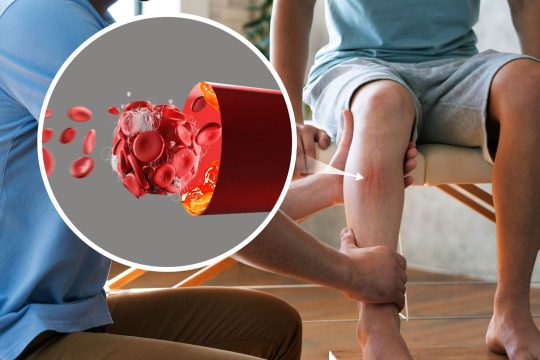
Varicose Veins vs. Spider Veins: The Basics
Varicose veins are large, twisted veins that appear mostly on the legs. They result from valve malfunctions within the veins, leading to blood pooling and vein enlargement. Symptoms include aching pain, swelling, and skin ulcers in severe cases.
Spider veins, on the other hand, are smaller, web-like veins visible on the legs and face. Mainly a cosmetic concern, spider veins are red or blue and do not bulge like varicose veins. They rarely cause discomfort but can indicate underlying circulatory issues.
Causes and Symptoms
Both conditions stem from venous insufficiency, with risk factors including genetics, age, hormonal changes, obesity, and prolonged standing or sitting. While varicose veins can cause significant discomfort, spider veins are usually symptom-free.
Modern Treatments by Dr. Sumit Kapadia
Treatment varies by condition severity but may include sclerotherapy, laser therapy, or surgery for varicose veins. Spider veins often respond well to lifestyle changes and non-invasive treatments. Dr. Kapadia emphasizes the importance of personalized treatment plans for effective results.
When to Seek Medical Advice
Consult a specialist if you experience pain, swelling, or skin changes associated with varicose veins or if spider veins' appearance concerns you. Early intervention can prevent complications and improve quality of life.
Conclusion
Understanding the differences between varicose and spider veins is crucial for seeking appropriate treatment. Dr. Sumit Kapadia offers comprehensive care for both conditions in Vadodara, leveraging the latest treatments to ensure optimal outcomes for his patients.
#vascular surgeon#dr. sumit kapadia#vascular surgery#endovascular specialist#vascular specialist#varicose vein treatment#varicose veins#laser treatment#peripheral arterial disease#veintreatment
0 notes
Text
Beat Varicose Veins Naturally: Dr. Kapadia’s Guide to Home Treatment
Dealing with varicose veins doesn't always require medical procedures. Dr Sumit Kapadia, Vadodara's leading varicose veins surgeon, reveals how natural and home-based remedies can significantly alleviate the discomfort caused by this common condition.
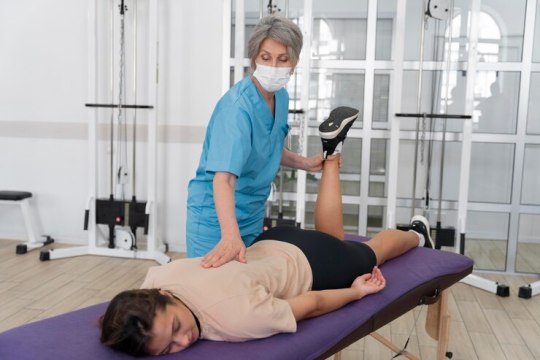
Causes of Varicose Veins and Preventive Measures:
Varicose veins develop due to weakened valves in the veins, with factors like genetic predisposition, hormonal changes, obesity, and prolonged standing playing key roles. Understanding these causes is essential for effective prevention, which includes maintaining a healthy lifestyle and regular physical activity.
Exercises Recommended by Experts for Varicose Vein Relief:
Exercise is a cornerstone of varicose vein management. Dr. Kapadia advocates for low-impact exercises like walking, cycling, and swimming, which improve circulation and strengthen leg muscles, helping to alleviate the symptoms of varicose veins. Gentle stretching and yoga can also provide significant benefits.
Nutritional Guidelines to Minimize Varicose Veins Symptoms:
A well-balanced diet is crucial in the fight against varicose veins. Incorporating fiber-rich foods, potassium, and antioxidants can help reduce the symptoms. Dr Kapadia advises avoiding foods high in salt and processed ingredients to prevent water retention and swelling.
Harnessing the Power of Herbal Remedies for Vein Health:
Herbal remedies can be a complementary approach to treating varicose veins. Natural supplements like horse chestnut and witch hazel may improve vein health. However, it's important to consult with a healthcare professional, like Dr. Kapadia, before starting any herbal regimen.
Gentle Massage Techniques Beneficial for Varicose Veins:
Massage therapy can aid in managing varicose veins by improving blood circulation. Gentle massage around the affected areas, avoiding direct pressure on the veins, can help reduce pain and swelling.
The Critical Importance of Staying Hydrated for Vein Wellness:
Hydration is key in maintaining vein health. Dr. Kapadia emphasizes the importance of drinking adequate water to ensure good blood circulation, which is vital in preventing and managing varicose veins.
Conclusion:
Varicose veins can often be managed effectively with home remedies and lifestyle changes. However, in cases where these methods are not sufficient, Dr. Sumit Kapadia offers expert medical treatment in Vadodara. Contact him for a personalized approach to varicose vein treatment, ensuring the best possible care for your vascular health.
#vascular surgeon#dr. sumit kapadia#vascular surgery#varicose vein treatment#varicose veins#endovascular specialist#home remedies for varicose vein
0 notes